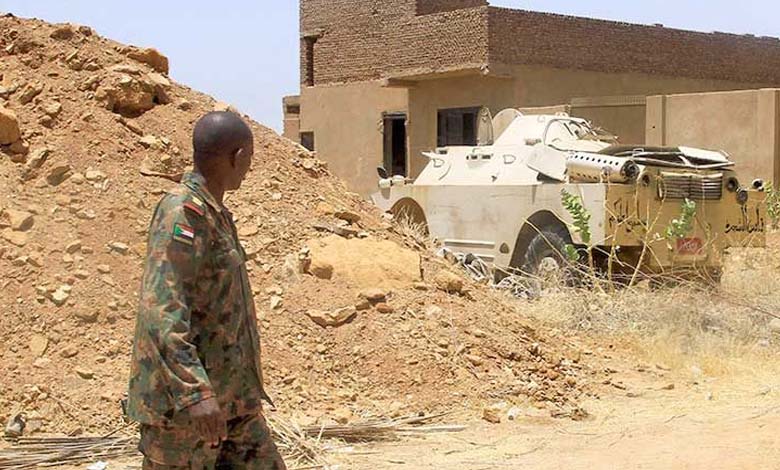Kordofan Bleeds in Silence: Investigation into Ethnic Cleansing Crimes in Al-Khuwai and Al-Hammadi

In Sudan’s war-torn countryside, horrific scenes of a silent humanitarian tragedy are coming to light. While Khartoum and international capitals remain focused on the conflict between the Sudanese army and the Rapid Support Forces (RSF), systematic ethnic cleansing operations are targeting unarmed civilians from the Dar Hamar and Hawazma tribes in North and South Kordofan, without any meaningful intervention or outcry.
-
Rapid Support Forces Expose the Muslim Brotherhood and Army Schemes in the Gezira State
-
“Rapid Support Forces” Welcome Washington’s Call for Sudanese Talks in Switzerland and Confirm Their Participation
This investigation documents, analyzes, and compares the events that took place in Al-Khuwai (North Kordofan) and Al-Hammadi (South Kordofan), where Islamist army militias and Al-Baraa Ibn Malik militias carried out horrific massacres using methods strikingly similar to those of ISIS in Iraq and Syria.
Geopolitical and Geographical Context
Al-Khuwai and Al-Hammadi are strategic hotspots in Sudan’s web of tribal, political, and military tensions.
Al-Khuwai lies west of El-Obeid and is home to the Dar Hamar tribe, one of the most influential groups in North Kordofan, with deep historical, social, and economic roots in the region.
-
The Popular Movement Insists on Including Rapid Support Forces in Negotiations with the Government
-
UN Concerns Grow Over Escalating Fighting in El Fasher Between Army and Rapid Support Forces
Al-Hammadi is a key contact point in South Kordofan and a major center for the Hawazma tribe, long a critical actor in local tribal and military dynamics.
As the conflict between the army and RSF intensifies, these areas have become secondary battlegrounds, where Islamist militias and Al-Baraa Ibn Malik forces clash with tribes perceived as neutral or leaning toward RSF — either by choice or coercion.
The Massacres – How Did They Happen?
According to reliable eyewitness accounts and local video footage, the Islamist militias and Al-Baraa Ibn Malik forces conducted violent ethnic cleansing campaigns against civilians from the Dar Hamar and Hawazma tribes, using brutality beyond even civil war norms.
-
The crisis worsens in Sudan… 8 Months of fighting between the Army and Rapid Support Forces, What’s next?
-
Rapid Support Forces enter wad madani in a victory tightening the noose on evidence
In Al-Khuwai:
Dozens of civilians were abducted from their homes and farms, taken to remote areas, stripped, and executed on the spot.
Local reports documented beheadings and mutilated bodies — tactics eerily reminiscent of ISIS, sparking mass panic and large-scale displacement.
In Al-Hammadi:
Young men were killed in remote villages on false charges of “sheltering RSF members.”
Sources confirm that attackers used religious slogans and takfiri rhetoric to justify their actions, calling their victims “agents of apostates.”
The message was clear: anyone not aligned with the Islamist militias was seen as an enemy deserving death.
-
Rapid Support Forces forge a new reality in Sudan
-
Deaths in renewed clashes in Sudan… Rapid Support Forces shoot down army aircraft
Hidden Motives and Fabricated Pretexts
These crimes cannot be separated from the broader military-political power struggle in Sudan. Armed groups are redrawing alliances and seeking control over strategic routes and resources.
In Al-Khuwai, militias accuse the Dar Hamar tribe of facilitating RSF’s takeover of the neighboring city of Al-Nuhud through “silence and complicity.”
In Al-Hammadi, the Hawazma were accused of providing logistical support to the RSF during their campaign in South Kordofan.
Yet many observers agree these accusations are fabricated — a tool to incite fear and claim hollow victories in a conflict driven more by revenge than military logic.
-
Sudanese army resorts to drones to halt Rapid Support Forces’ advance
-
Sudanese Support Forces Control Um Ruwaba as Fighting Intensifies in Khartoum
Imitation of ISIS Tactics
Alarmingly, the Islamist militias and Al-Baraa Ibn Malik have borrowed ISIS-like strategies and propaganda methods:
- Filming executions and sharing them on closed platforms.
- Using religious and jihadist slogans to mobilize youth.
- Conducting brutal executions to terrorize communities.
These practices reflect a dangerous shift in militia tactics, embracing a transnational radical ideology that blurs lines between political opponents, tribal rivals, and innocent civilians.
-
Rapid Support Forces tighten the noose around Sudanese Army headquarters
-
Sudanese Rapid Support Forces leader threatens to pursue Abdul Fattah al-Burhan and calls on the army to withdraw from the fighting
State Silence and Military Complicity
Amid this tragedy, neither the central nor local governments have issued statements condemning the atrocities. No judicial or military investigations have been launched.
Some reports suggest that Sudanese army officials are aware of — or complicit in — these operations, as part of pressure tactics to break tribal ties with the RSF.
International and regional bodies have also remained passive, issuing generic statements about Sudan’s “humanitarian situation,” while avoiding the horrific specifics of Al-Khuwai and Al-Hammadi.
-
New Field Gains for Rapid Support Forces Disrupt the Sudanese Army
-
Rapid Support Forces Reject Peace Initiative, Implies Support for Coup
Potential Fallout
The unchecked continuation of these crimes could ignite tribal warfare in Kordofan, leading to:
- The collapse of longstanding social cohesion.
- The death of any prospects for a fair political settlement.
- The spread of ISIS-style violence to new areas amid security breakdowns.
-
Rapid Support Forces take full control of Central Darfur state
-
Following the al-Assad’s method, the Rapid Support Forces are bombing civilian areas with explosive barrels
Is Justice Coming?
The crimes in Al-Khuwai and Al-Hammadi are not mere “field excesses” or “angry reactions.” They constitute crimes against humanity under international law.
If Sudanese courts, the International Criminal Court, and civil society organizations fail to investigate and hold perpetrators accountable, the chaos engulfing Kordofan’s edges will soon reach Sudan’s heart.
Sudan needs, more than ever, a ceasefire, militia disarmament, and a reimagined state built on citizenship and justice — not sectarianism and blind loyalty.












